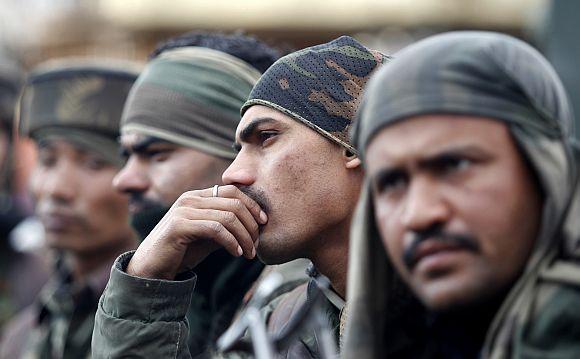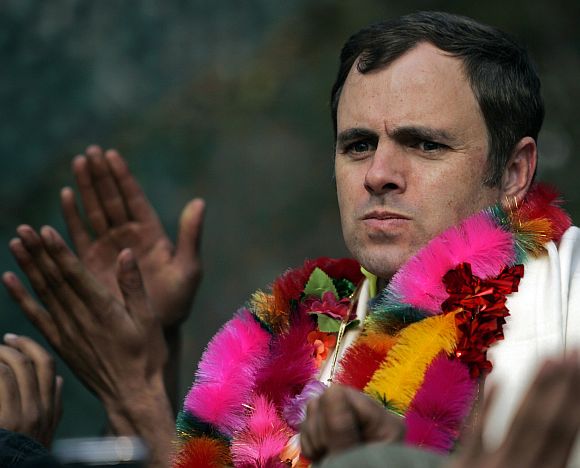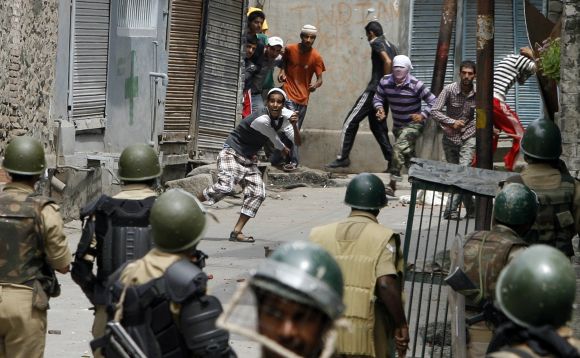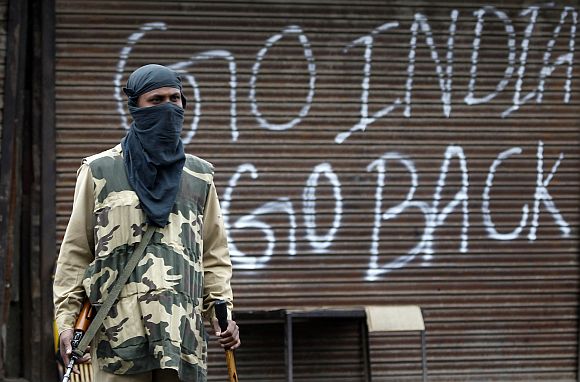 | « Back to article | Print this article |
AFSPA row: Delhi must DECIDE if Kashmir's still a conflict zone
Amid a raging debate over AFSPA, a focused internal political dialogue must be launched in Kashmir to reassure the army that yet another hard-won peace will not be squandered by political lethargy, writes Ajai Shukla
India is witnessing a bitterly polarised debate over Jammu and Kashmir Chief Minister Omar Abdullah's proposal to revoke the Armed Forces Special Powers Act from Srinagar and Badgam in Kashmir, and from Jammu and Samba towns in the Jammu region.
Abdullah, backed by broad swathes of the media, wants a peace dividend for his people after a year of relative normalcy.
This could be provided, he says, by loosening AFSPA, an emergency law that has since 1990 given army soldiers in J&K the legal backing to search, apprehend and shoot to kill.
The army, backed opportunistically by the Bharatiya Janata Party, insists that the fragility of the current peace makes it too early to loosen AFSPA.
Please click NEXT to read further...
'Army counters Omar's assurance that AFSPA can easily be re-imposed'
In its opposition to loosening the AFSPA, the army has been painted as an unreasoning bully with an aversion to Kashmiris and a pernicious addiction to violence. This is not true.
The army has, in fact, offered a persuasive counter-argument in meetings of the Unified Command Headquarters, with Omar Abdullah listening in.
The AFSPA was legislated by Parliament for J&K on July 5, 1990, when "Azadi" -- chanting mobs took over swathes of the valley. AFSPA's special powers apply in "disturbed areas" that must be notified by New Delhi or the state governor.
Today Abdullah wants the denotification of Srinagar, Badgam, Jammu and Samba as "disturbed areas".
The army says not yet, because Kashmir presents not just a law-and-order problem but an existential threat to India. It counters the J&K CM's assurance that AFSPA can easily be re-imposed if the situation deteriorates by arguing that this might be politically impossible.
'The peace of 2011 was a tactical pause'
It worries about the logistical lifelines to army outposts on the Line of Control, which runs through Srinagar and Badgam. The generals also reject Abdullah's contention that the army does not operate in Srinagar and Badgam and, therefore, does not need AFSPA there; they say that while the CRPF mans checkposts inside those towns, army columns dominate the outskirts and keep militants at bay.
The approaches to Srinagar airfield, used by civilian airliners and military aircraft, are secured by the military. Within Srinagar itself lies the massive cantonment of Badami Bagh, headquarters of 15 Corps, which is responsible for the defence of the Valley.
Top military commanders tell Abdullah that the peace of 2011 was a tactical pause after three straight years of "intifada-type" street agitation. This would let a fatigued populace recover, intensify participation from intellectuals and students, and neutralise the J&K Police. After this mid-course correction, 2012 could well see a resumption of the agitation.
The army rejects Abdullah's implicit assumption that J&K has transitioned from conflict to "post-conflict stabilisation".
'AFSPA has become a lightning rod for Kashmiri discontent'
Pakistan's Foreign Minister Hina Rabbani Khar apparently urged Kashmiri hardliner Syed Ali Shah Geelani during their meeting in Delhi in July to prepare for a long struggle still ahead.
Equally worrying for the army is Srinagar's slothfulness in reintegrating over 20,000 surrendered militants, who could rejoin a reinvigorated struggle.
Running alongside the army's security case is a competing narrative of political transformation. After three years of street protests in Kashmir, Home Minister P Chidambaram's Rajya Sabha speech on August 5, 2010, admitting that J&K was "a unique problem requiring a unique solution", was followed by sustained internal peace-building.
That autumn, a massive rally at Langate in north Kashmir saw participants renouncing violent protest if human rights violations were prevented. Then, Kashmir's moderate separatists spoke out against killings by militants after Jamiat Ahl-e-Hadith leader, Maulana Showkat Shah, was assassinated in Srinagar in April.
The Lashkar-e-Tayiba was forced by popular pressure to issue an apology. The peace of 2011 and record tourist arrivals in Srinagar are a reality; the army's prediction of the coming storm may remain just an apprehension.
What neither side will contest is that AFSPA has become a lightning rod for Kashmiri discontent. It has developed into an evocative symbol of repression, resulting in the army being besmirched in controversies in which it played no part, such as the police firing on Kashmiri demonstrators in 2010.
'If AFSPA is to be loosened, the army's concerns must be assuaged'
It has also allowed propagandists of Pakistani Inter Services Intelligence like Ghulam Nabi Fai to propagate the notion of "India's military repression of Kashmiris".
AFSPA presents an urgent political decision. New Delhi must decide whether J&K is still a conflict zone or it is time to reinforce Kashmiri peace. Omar Abdullah is sagacious in declaring that this cannot be a public debate.
If AFSPA is to be loosened, the army's concerns must be assuaged. Key parties must reassure the army that the re-imposition of AFSPA will not be politicised.
Kashmiri separatist and citizen groups must pledge not to allow protests to interfere with army movements to and from the border. A refusal to provide such a commitment would place on them the onus for AFSPA's continuation.
The state administration would need to permanently position J&K policemen and magistrates with army formations so that operations can be launched in a non-AFSPA environment without delay or leakage of information.
Most importantly, a focused internal political dialogue must be launched in Kashmir to reassure the army that yet another hard-won peace will not be squandered by political lethargy.





